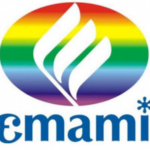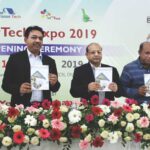Kotkamills is pleased to see that India has taken the lead in implementing the plastic ban and finding alternative solutions to single-use plastic for food items. Recognizing the importance of the ban, the company has launched AEGLE Barrier and ISLA in cooperation with Asia Pulp and Papers.
Here are a few excerpts from interviews with Saila Kettunen, Director, Barrier Boards, Kotkamills, Mr. Ajay Gupta, Director, Asia Pulp and Paper Pvt. Ltd., and Mr. Arjun Gupta, Director, Asia Pulp and Paper Pvt. Ltd.

Paper Mart: Tell us about your engagement with Asia Pulp and Paper in terms of marketing your products in India. What exactly are you expecting from Asia Pulp and Paper in this regard?
Saila Kettunen: Asia Pulp and Paper Pvt. Ltd. is our selected distributor and converter in India. We are impressed by their high-quality know-how and ability to convert packaging board used for food service applications. Combined with nationwide network of logistics hubs and warehouses, Asia Pulp and Paper has been able to provide local and fast service to Indian paper-cup and folding-carton producers using Kotkamills’ board products. It is a great advantage for us to be able to ship full container loads of our products to different locations in India where they can be used for specific purposes, enabling quick deliveries to Indian customers. The runnability of our products at Asia Pulp and Paper’s machines is excellent.
”
Kotkamills is pleased to see that India is taking the lead in implementing the plastic ban and finding
alternative solutions to single-use plastic in food service items
“
PM: What factors led you to decide that it is the right time to launch AEGLE Barrier and ISLA in India?
SK: India has come to realize that it is important to get rid of plastics in single-use packaging. With the cooperation of Asia Pulp and Paper, which began in the middle of 2018, we have been able to conduct more than 100 trial runs with end customers, from big brand owners to small-scale cup producers.
PM: AEGLE Barrier and ISLA are two high value-added products and must be a little costlier than what we are using in India. Do you think that the Indian market is ready for such products?
SK: Yes, we think that the Indian market is ready to reduce the quantity of plastic materials in packaging and food-service items. The market is quite willing to start using Kotkamills’ plastic-free barrier board products which are easy to recycle. Recycling enables the re-use of fibers for even six times after their first use. How quickly the change will happen is something that depends on brand owners, consumers and legislation.
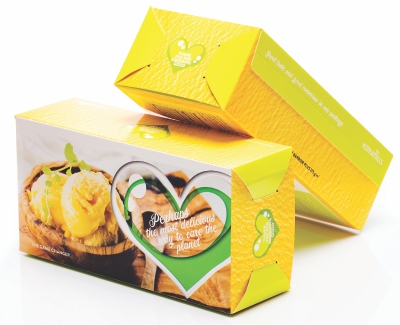
PM: Tell us about the USP of these products and their advantages over the traditional food-grade material. Do major food industries prefer these packaging products to PE-coated materials?
SK: Compared to polyethylene-coated or waxed cartons, Kotkamills’ Barrier Board products are plastic-free and easy to recycle. Kotkamills is pleased to see that India is taking the lead in implementing the plastic ban and finding alternative solutions to single-use plastic in food service items. A similar trend is developing in the EU where certain single-use plastic items would be banned in a few years’ time. In France, for example, plastic cups would be replaced by fiber-based cups in the year 2020.
”
The Indian market for recycled fibers is large; therefore, it encourages packaging users to create local recycling loops to collect and re-use used packages
“
PM: What have you to say for packaging products, trends, and practices in India? How will your products make a difference in the country?
SK: India’s huge food delivery business is unique. In India, grease-resistant folding cartons and boxes and paper cups are mainly used. This market is quite fragmented. In order to serve many brand owners and converters, we need a company like Asia Pulp and Paper to provide local service. It is quite remarkable that used paper cups made from Kotka Mills’ products have a high value as recycled raw material. They are 100 percent recyclable in normal paper recycling streams, and wood fibers can be re-used in other paper and board products as there is no plastic in our board. The Indian market for recycled fibers is large; therefore, it encourages packaging users to create local recycling loops to collect and re-use used packages.
PM: What are your short-term and long-term goals?
SK: We keep track of the developments taking place on the market. We conduct trials with potential customers. Our long-term goal is to be the leader in supplying plastic-free fiber-based packaging materials to the Indian market.
PM: Tell us about your company’s recent tie-up with Kotkamills, Finland. Where does your company figure in the value-chain?
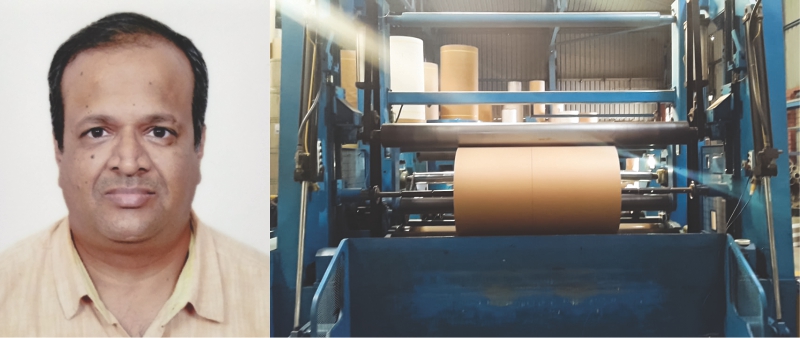
Ajay Gupta: Kotkamills is the leader in offering a unique plastic-free, fully recyclable and eco-friendly board for the paper cup and food box industry. Asia Pulp & Papers is a family-owned company headquartered in Bengaluru. It provides value-added paper converting and distribution. Our business model aims to bring world-class products and mill-class converting to our customers in India. Our focus is on bringing high-quality packaging grades of paper to cater to fast-evolving segments like corrugating, paper bags, food packaging, etc. We provide products converted from stocks in jumbo format held in our plant in three working days against a typical lead time of 90 days from order for import. Our role is to make sure that customers get excellent mill-quality converting, packing and handling when they buy products from our plants. We provide value-added distribution for mills and hassle-free, just-in-time products to our customers. Kotka’s unique product and APP’s converting and distribution strengths in India will enable small and big convertors in the food packaging space to quickly and competitively move to sustainable raw materials.
”
Kotka’s unique product and APP’s converting and distribution strengths in India will enable small and big convertors in the food packaging space to quickly and competitively move to sustainable raw materials.
“
PM: Why did you choose Kotkamills’ products, AEGLE Barrier and ISLA, for the Indian market? What are your primary marketing areas?
AG: Many states in India have banned single-use plastics in food service/delivery. FSSAI has issued guidelines with respect to use of food safe packaging. Many companies are taking the lead in moving to sustainable packaging and plastic-free/PE-free packaging. The market needed a product produced in an environmentally sustainable manner, a product that is functionally superior, a product that is easy to recycle and a product that is ahead of regulations for food safety and reduces use of plastics. Our global search led us to just one company – Kotka. We are delighted that they have partnered with us to introduce this best-in-class product to India and that India is one of the first few countries where this product has been successfully launched. Every environmentally conscious and compliant food/food service company in India is our potential customer.
PM: Tell us about your long-term marketing strategy for the Indian market with regard to these products?
AG: We have introduced Kotka to various food companies and convertors with the objective of reaching those who are environmentally conscious and compliant with local regulations relating to food safety and plastic-free packaging. We have done extensive sampling and seed marketing, and the response has been very encouraging. To expand our reach on the Indian market, we are continually looking to expand our channel network.
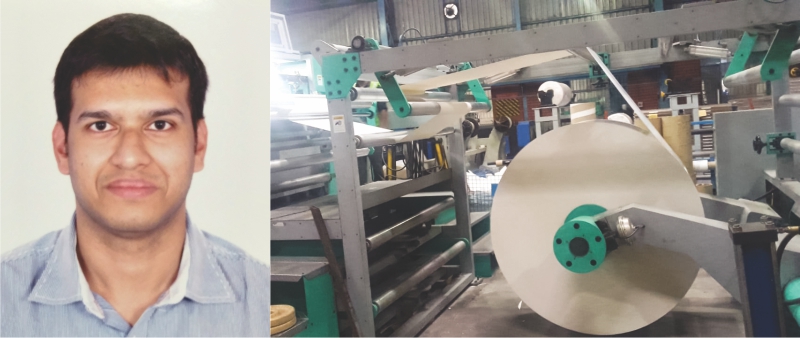
PM: Given that India is also producing food grade kraft and board products, why do you think these products, which are probably costlier, can be sold in the marketplace?
Arjun Gupta: India is a huge, growing market. A producer, Indian or global, who can provide the right quality and functionality and conforms to all regulations gets the opportunity to do business here. The only thing that is more expensive than quality is ‘poor quality’. This holds good for most businesses, more so for food packaging/food service. There is enough room for domestic and global producers with the right-quality offering at the right price. Apples to apples, we have great mill support and deep commitment to the Indian market and we have a competitive product.
”
The food packaging business is growing at nearly 15 percent CAGR. The new FSSAI regulations and ban on single-use plastics open bigger opportunities for products that can meet both the food safety and environmental sustainability requirements.
“
PM: Give us an idea of the Indian market with respect to food-grade packaging in terms of major domestic players, volumes, and market size. Will this segment keep growing in the coming 3 to 5 years?
Arjun Gupta: The food packaging business is growing at nearly 15 percent CAGR. The new FSSAI regulations and ban on single-use plastics open bigger opportunities for products that can meet both the food safety and environmental sustainability requirements. The food-delivery business in India has been doubling every year for the last three years. Even if it slows a bit due to its large base, we will surely see high double digit growth rates in the coming five years. There are many companies in India with food-safe products, but we do not see them offering the functionality that Kotka is offering on plastic-free board. We are sure that over time the number of players will increase, which will push innovation and cost-efficiencies up – something that will have a positive impact on the market and consumers.


